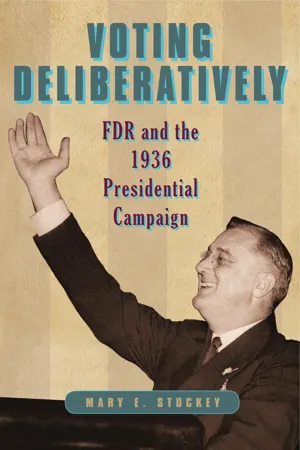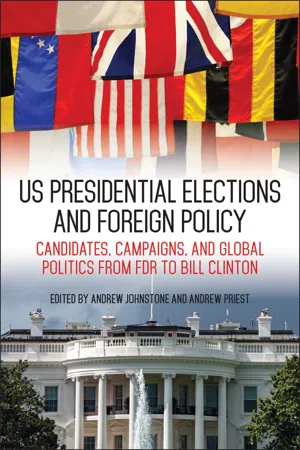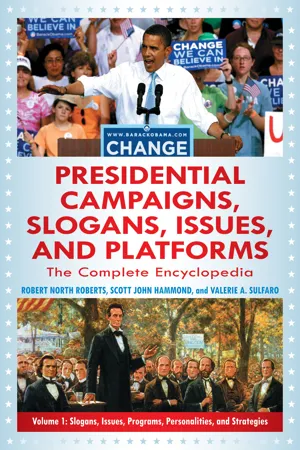History
1944 Presidential Election
The Presidential Election of 1944 in the United States saw Franklin D. Roosevelt running for a fourth term as President, making him the only president to be elected to a fourth term. Roosevelt's running mate was Harry S. Truman. The election took place during World War II, and Roosevelt's leadership during the war was a key factor in his re-election.
Written by Perlego with AI-assistance
Related key terms
1 of 5
3 Key excerpts on "1944 Presidential Election"
- eBook - PDF
Voting Deliberatively
FDR and the 1936 Presidential Campaign
- Mary E. Stuckey(Author)
- 2015(Publication Date)
- Penn State University Press(Publisher)
introduction: roosevelt and the 1936 election A few short months before the election, the outcome seemed anything but certain. Both internal White House polls and the public polls conducted by the media supported the wide range of available anecdotal evidence: the presi- dent was in trouble. His first election, in the wake of a thoroughly discredited Republican administration, had once seemed to hold the promise of Demo- cratic dominance for the foreseeable future. But continuing economic prob- lems, a controversial domestic agenda, and a foreign policy that seemed weak and vacillating eroded the administration’s support among the mass public. The administration was attacked every day on the nation’s mass media and the president faced vicious and unrelenting criticism from both the Right and the Left, some of it aimed at his policies, much of it directed at the person of the president himself. Such criticism even escalated into the formation of a new political party dedicated, it appeared, exclusively to undermining the president and attacking his programs. From all the available evidence, then, it seemed unlikely that the president was about to make history. But his reelection was indeed historic. Franklin Delano Roosevelt won the 1936 election with nearly 61 percent of the vote, capturing forty-six of the forty- eight states, losing only in Maine and Vermont. Looking back at that result and knowing, as we do now, the entirety of the legacy left to us by FDR, it is easy to forget how contestable—and how contested—his administration actu- ally was. 1 It is also easy to overlook the innovations of that campaign and the consequences they had for the practices of American democracy. 2 This book 2 voting deliberatively examines that campaign with an eye toward understanding an underexam- ined moment in our national history and analyzing how the elements of that campaign reveal contemporary patterns in American elections as delibera- tive events. - eBook - ePub
US Presidential Elections and Foreign Policy
Candidates, Campaigns, and Global Politics from FDR to Bill Clinton
- Andrew Johnstone, Andrew Priest, Andrew Johnstone, Andrew Priest(Authors)
- 2017(Publication Date)
- The University Press of Kentucky(Publisher)
2 FDR’s Closest Contender Thomas E. Dewey and the 1944 ElectionJ. Simon RofeThe 1944 Presidential Election stands alone as the only election fought since 1940 while the United States was an active belligerent in a war of national survival: the Second World War. In that light, the reelection of the thirty-second president of the United States, Franklin Roosevelt, in November 1944 while millions of Americans were active combatants would seem to have been a foregone conclusion. This is the starting point for David M. Jordan’s 2011 FDR, Dewey, and the Election of 1944.1 Yet the vigorous contest between the forty-two-year-old New York governor Thomas E. Dewey and Roosevelt was the closest the incumbent fought as president. Dewey polled almost 46 percent of the popular vote to Roosevelt’s 53 percent.2 While Jordan asserts that the “biggest issue in the campaign was who was better suited to bring the war to a conclusion and handle the issues of peace thereafter,” at the time Roosevelt’s leading speech writer, Samuel Rosenman, thought differently.3 He wrote that, outwardly at least, “there seemed to be very little difference between the parties on foreign policy.”4In light of this difference of opinion, this chapter will explore the influence of foreign policy on the 1944 Presidential Election. It will begin by explaining how Dewey’s background came to influence his political outlook and therefore his presidential campaign in 1944. It will then identify twin foreign policy influences on the 1944 election. The first and most straightforward was that the United States was a nation, like many others, at war, and this had a huge impact on the campaign. The influence of the war—the main if not sole focus of the Roosevelt administration’s foreign policy—was felt by those at home as well as by those in uniform overseas. The second influence was the decision by Dewey not to campaign on the extent of the administration’s prior knowledge of the Japanese attack on Pearl Harbor. While the precise level of explicit knowledge was the subject of postwar Senate hearings (and numerous postwar conspiracy theories), Dewey’s begrudging discretion, strongly encouraged by US Army chief of staff General George C. Marshall, limited the scope of his ability to critique the administration and its prosecution of the war. Marshall counseled that campaigning on Pearl Harbor would alert the Japanese to US success in decrypting the Japanese “Purple” code at time when Japan was far from defeated. The extent to which such a critique would have landed a mortal blow to Roosevelt’s reelection in 1944 can only be a matter of conjecture. What cannot be doubted is that Dewey’s decision to heed Marshall’s concern removed from the Republican’s arsenal a weapon to damage Roosevelt. Dewey’s discretion helps illustrate, in the words of the historian Gaddis Smith, “a man of integrity, almost compulsive competence, and considerable insight into himself and others.” Smith concludes: “He would have been a good President.”5 - eBook - ePub
Presidential Campaigns, Slogans, Issues, and Platforms
The Complete Encyclopedia [3 volumes]
- Robert North Roberts, Scott John Hammond, Valerie A. Sulfaro(Authors)
- 2012(Publication Date)
- Greenwood(Publisher)
History of American Presidential Politics, 1789–1968, vol. 3 (New York: McGraw-Hill, 1971).Doenecke, Justus, “1940,” in Arthur M. Schlesinger, Fred L. Israel, and David J. Frent, eds., Running for President: The Candidates and Their Images, vol. 2 (New York: Simon & Schuster, 1994).Moscow, Warren, Roosevelt and Willkie (Englewood Cliffs, NJ: Prentice-Hall, 1968).Peters, Charles, Five Days in Philadelphia: 1940, Wendell Willkie, FDR, and the Political Convention that Freed FDR to Win World War II (New York: Public Affairs, 2006).Smith, Jean Edward, FDR (New York: Random House, 2008).Passage contains an image
Campaign of 1944
“The Republican Party accepts the purposes of the National Labor Relations Act, the Wage and Hour Act, the Social Security Act and all other Federal statutes designed to promote and protect the welfare of American working men and women, and we promise a fair and just administration of these laws.” Inserting this plank into their 1944 campaign platform, the GOP pledged to sustain these as well as many other programs that were generated by the Democrats under President Franklin Roosevelt’s New Deal. Even though the Republican platform abstractly vilified the New Deal on principle, when it came to specifics, much of Roosevelt’s social and economic vision for the country had now been accepted across party lines. Roosevelt grew bolder: in his 1944 State of the Union address, FDR sketched what he deemed a “second Bill of Rights,” or “economic rights,” that he conceived as encapsulating his vision of a postwar United States, rights that reaffirmed his general progressive vision and that resonated with the majority of American voters. Roosevelt was so dominant in the political landscape that there was no question of his standing for a renomination by his party for a fourth term. Few leaders were trusted to cope with the apocalyptic crises that had roiled across the globe over the past five years, and the Democrats knew better than anyone that FDR had to continue on. Conservatives within the party were far from enamored with the president, but they were in the minority, and savvy enough to know that the Roosevelt name was enough by itself to guarantee the nomination.
Index pages curate the most relevant extracts from our library of academic textbooks. They’ve been created using an in-house natural language model (NLM), each adding context and meaning to key research topics.


